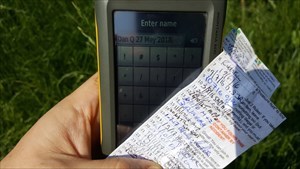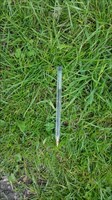This checkin to GLVYGYQ1 Easy as 1-2-3! reflects a geocaching.com log entry. See more of Dan's cache logs.
Given that I live very close to this cache (and have done since well before it was placed) I hope you’d forgive me for taking my time to getting around to solving and logging it. Because I was solving GC5R4B3 (Boggling Boolean) today anyway, I thought I’d take a proper look at this for the first time. A quick Google search confirmed my suspicions about what I was looking at and gave me the necessary resources to learn how to read it, and then I was on my way by bike to the general area. I went via GC5R4B3 where I unfortunately left my pen, meaning that I didn’t have it with me when I got to this cache!
Therefore, by way of proof-of-finding, I’ve attached a (non-spoilery) photo of the log from the cache, sitting atop my GPSr whose screen is showing my name and the current date. If CO really wants me to go back up and sign it for-real than I will, but I’ll tell you what: I’m wearing long trousers (or taking a lawnmower) next time!
Lovely cache container in a place I didn’t even know existed; thanks!
Oh, and also: by some counts (this site’s, i.e. ignoring caches logged on other sites) this is my 400th cache. So that’s nice.

